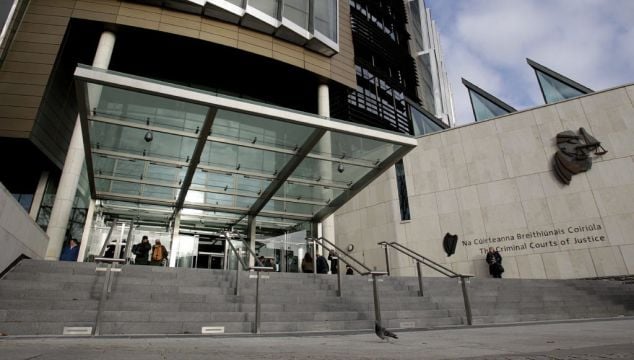Lawyers for four men accused of taking part in the “gang rape” of a teenage girl in a car over five years ago have told jurors it was not their role to judge the morality of the events that night.
In the early hours of the morning of December 27th, 2016, in a midlands town, the then 17-year-old girl got into a car with five men, a decision she has told the jury she now believes was “very stupid”.
The defendants each allegedly sexually assaulted her as the car was driven out of the town.
The car was driven to a remote location nearby and three of the defendants, and a fifth man who is not on trial, allegedly raped her at this location one after another.
The jury has heard that two of the defendants were later dropped off at a house back in the town and the car was driven to another location.
The woman has said that she asked to be let out of the car but was ignored and that one man raped her for the second time at the same time as a fourth man sexually assaulted her.
The defendants, who were aged between 17 and 19 at the time, deny all the charges. Neither they nor the complainant can be identified in accordance with the 1981 Rape Act.
'Unedifying behaviour'
Evidence ended on Thursday morning and closing speeches have begun and will continue on Friday before Justice Tara Burns and a jury.
Closing his case for the youngest accused, the driver, Brendan Grehan SC told the jury what happened on the night was by any standard “unedifying behaviour”.
He said that sexual activity normally takes place in private, is not normally voyeuristic, not normally recorded on video and does not normally involve sequencing of activity.
He said that none of these features in themselves make up criminal conduct, but that they may explain some of the reactions of people after the events.
“They might say something about why someone may want to lie about it or might want to apologise,” he said.
He told jurors while they might disapprove of what happened that night and find it morally reprehensible, they were not there to make moral judgements.
He said it is accepted that his client lied, but he said the jury will be told that people can lie for innocent reasons.
He said in his client's case he lied out of embarrassment and shame and was afraid that “he would lose everything” and would not be allowed to travel abroad for necessary medical treatment.
“Who wouldn't be ashamed of being involved? No matter what way you dress it up, it doesn’t reflect well on the persons involved, which isn't to say it amounts to sexual crimes,” he said.
He said his client admits to some sexual activity which he says was consensual, but does not admit to penetrative sex.
'Yes is rarely expressly spoken'
In relation to the question of consent, Mr Grehan said that “in the context of sexual matters, yes is rarely expressly spoken” and “it is more of an implied position”.
He said that communication is done on many different levels apart from speech. He said the reality of human affairs is that a positive response may be communicated “by body language, by going along with a suggestion, by touch, a glance, a sign, a mood change”.
“We know instinctively if somebody is unhappy with something,” he said.
He said that his client is alleged to have been the second person to rape the girl and that a third person, who is not on trial, got into the car and raped her.
He said that the complainant's evidence is that she only said stop to the third person and also at this point she said stop to whoever was recording the activity.
“Was that because she was afraid it would be shared?” Mr Grehan asked.
He said that the jury could decide that the complainant was not consenting to sexual activity and also that his client did not know this and that he believed, on reasonable grounds, that she was consenting.
He said the prosecution case is that the girl “didn't have any voice” but the evidence was that at a later stage that morning she got angry and demanded a mobile phone and that his client gave her one and she used it to get on to Facebook and contact a friend.
'She thought her parents would kill her'
Colman Cody SC, defending the third accused, said that the woman showed herself capable of being “demanding” and assertive when, in her own words, she became aggressive and asked for the use of a phone.
He said that the actions of the driver in providing his phone were not consistent with someone who thought the girl had been raped.
He said that 24 minutes after dropping the girl off at a location close to her friends, the driver then contacted her again on Facebook to let her know they had found her passport in the car.
Mr Cody said that the girl was undoubtedly distressed when she met her friends, and they prevailed on her to go to gardaí but “she didn't want to, she refused to” because “she didn't want her parents to know, she thought her parents would kill her”.
He said on one interpretation this was understandable, but on another it might suggest that the complainant “might have had some doubts as to what transpired”.
“She was going to have to account for her movements. What was prompting her distress. Was the fact or belief on her part that the activity had been recorded the catalyst for these allegations,” Mr Cody said, adding that this was something that could be very embarrassing.
He asked jurors to consider the evidence that when the car was dropping two of the men off, the girl moved from the “comparative isolation” of the front seat to the back “into the company of two of her alleged assailants”.
He said this indicated someone capable of making decisions and was not reflective of someone subjected to the actions she has alleged. He said at the very least there is an incongruity here.
He accepted that his client had lied to gardaí about the events on the night, but said this could be put down to “instinctive panic reaction” by a young man who was never before in a Garda station.
Stressed
At the end of a number of Garda interviews, Mr Cody's client later told gardaí that he lied earlier because he was stressed, that he believed he and the others had taken advantage of the girl, and that he would ask her to forgive them.
He told gardaí: “I am really sorry I thought she wouldn't be like this, she wanted it, but now she is going through all this.”
Mr Cody said that these were expressions of regret in hindsight for what happened and of the embarrassment for what occurred.
“Regret over something cannot and should not automatically be translated into acceptance of an allegation of rape,” he said.
He said it might also be possible that the complainant had some regrets over what happened and this was what motivated her allegations.
Counsel told the jury that a situation in which there were five males and one girl having sexual activity in a car did not “automatically transform this event to gang rape”.
He said it was not their role to bring moral judgements to the events. He said his client's case is that “he had an honest subjective belief that there was consent to the various sexual acts that he admitted he engaged with”.

He said “there is evidence to support his contention that she was consenting at relative times”.
“Could you reach a conclusion that he had no basis for belief she was consenting? Could you be satisfied beyond all reasonable doubt that he did not honestly believe that there was consent?” he asked jurors.
If you have been affected by any of the issues raised in this article, you can call the national 24-hour Rape Crisis Helpline at 1800 77 8888, access text service and webchat options at drcc.ie/services/helpline/, or visit Rape Crisis Help.
In the case of an emergency, always dial 999/112.







